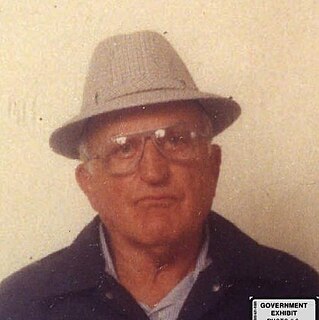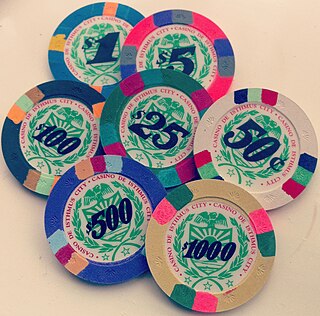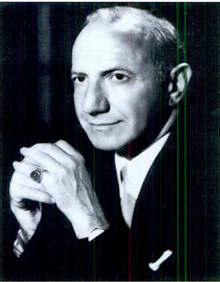Related Research Articles
Boyd Gaming Corporation is an American gaming and hospitality company based in Paradise, Nevada. The company continues to be run by founder Sam Boyd's family under the management of Sam's son, Bill Boyd, who currently serves as the company's executive chairman after retiring as CEO in January 2008.

Joseph John Aiuppa, also known as "Joey O'Brien" and "Joey Doves", was a Chicago mobster who became a leader of the Chicago Outfit from 1971 until his skimming conviction in 1986.

Casino tokens are small discs used in lieu of currency in casinos. Colored metal, injection-molded plastic or compression molded clay tokens of various denominations are used primarily in table games, as opposed to metal token coins, used primarily in slot machines. Casino tokens are also widely used as play money in casual or tournament games.

Gambling in Macau has been legal since the 1850s when the Portuguese government legalised the activity in the autonomous colony. Since then, Macau has become known worldwide as the "Gambling capital of the world" or "Monte Carlo of the East".

Casino is a 1995 American epic crime film directed by Martin Scorsese, produced by Barbara De Fina and distributed by Universal Pictures. The film is based on the 1995 nonfiction book Casino: Love and Honor in Las Vegas by Nicholas Pileggi, who also co-wrote the screenplay for the film with Scorsese. It stars Robert De Niro, Sharon Stone, Joe Pesci, Don Rickles, Kevin Pollak and James Woods. The film marks the eighth collaboration between director Scorsese and De Niro.
Frank Lawrence Rosenthal, also known as "Lefty" Rosenthal, was an American professional sports bettor, former Las Vegas casino executive, and organized crime associate. Sam "Ace" Rothstein, the protagonist of Martin Scorsese's film Casino (1995), is based on Rosenthal.

The Stardust Resort and Casino was a casino resort located on 63 acres (25 ha) along the Las Vegas Strip in Winchester, Nevada.

Lester Ben Binion was an American gambling icon, career criminal, and convicted murderer who established illegal gambling operations in the Dallas-Fort Worth, Texas area. He would later relocate to Nevada, where gambling was legal, and open the successful Binion's Horseshoe casino in downtown Las Vegas.

Sports betting is the activity of predicting sports results and placing a wager on the outcome. The frequency of sports bet upon varies by culture, with the vast majority of bets being placed on association football, American football, basketball, baseball, hockey, track cycling, auto racing, mixed martial arts, and boxing at both the amateur and professional levels. Sports betting can also extend to non-athletic events, such as reality show contests and political elections, and non-human contests such as horse racing, greyhound racing, and illegal, underground cockfighting. It is not uncommon for sports betting websites to offer wagers for entertainment events such as the Grammy Awards, the Oscars, and the Emmy Awards.

The Chicago Outfit is an Italian-American organized crime syndicate based in Chicago, Illinois, which dates from the 1910s. It is part of the larger Italian-American Mafia and originated in South Side, Chicago.
The table limit is the minimum and maximum bet that a gambler can make at a gaming table. It is a form of yield management in that the limits can be changed to optimize the profit from a gaming table. Gaming tables have a limited resource to sell: the seats used by the players.
Nicholas Civella was a Kansas City, Missouri mobster who became a prominent leader of the Kansas City crime family.

Frank Peter Balistrieri, also known as "Mr. Big", "Frankie Bal", "Mr. Slick", “Mr. Fancy Pants”, and "Mad Bomber", was a Milwaukee Mafia boss who was a central figure in skimming during the 1980s.
A form of white-collar crime, skimming is slang for taking cash "off the top" of the daily receipts of a business and officially reporting a lower total. The formal legal term is defalcation.
Donald Angelini was a mobster nicknamed "The Wizard of Odds" with the Chicago Outfit, a criminal organization that specialized in gambling operations.
The Kansas City crime family is an Italian-American Mafia family based in Kansas City, Missouri.
Most forms of gambling in Japan are generally banned by the Criminal Code chapter 23; however, there are several exceptions, including betting on horse racing and certain motor sports.
The American Mafia, commonly referred to in North America as the Italian-American Mafia, the Mafia, or the Mob, is a highly organized Italian-American criminal society and criminal organization. The organization is often referred to by its members as Cosa Nostra and by the government as La Cosa Nostra (LCN). The organization's name is derived from the original Mafia or Cosa nostra, the Sicilian Mafia, with "American Mafia" originally referring simply to Mafia groups from Sicily operating in America, as the organization initially emerged as an offshoot of the Sicilian Mafia. However, the organization gradually evolved into a separate entity partially independent of the original Mafia, and it eventually encompassed or absorbed other Italian-American gangsters and Italian crime groups living in the United States and Canada that were not of Sicilian origin. It is often colloquially referred to as the Italian Mafia or Italian Mob, though these terms may also apply to the separate yet related Sicilian Mafia or other organized crime groups in Italy.

The Mob Museum, officially the National Museum of Organized Crime and Law Enforcement, is a history museum located in Downtown Las Vegas, Nevada. Opened on February 14, 2012, the Mob Museum is dedicated to featuring the artifacts, stories, and history of organized crime in the United States, as well as the actions and initiatives by law enforcement to prevent such crimes. The museum is housed in the former Las Vegas Post Office and Courthouse, which was built in 1933 and is listed on the National Register of Historic Places. The museum is located on Stewart Avenue, two blocks north of Fremont Street, the main artery of the downtown casino district.

Edward Levinson was an American gambling operator.
References
- Pileggi, Nicholas (1995). Casino: Love and Honor in Las Vegas . Simon & Schuster. ISBN 0-684-80832-3.
| | This crime-related article is a stub. You can help Wikipedia by expanding it. |